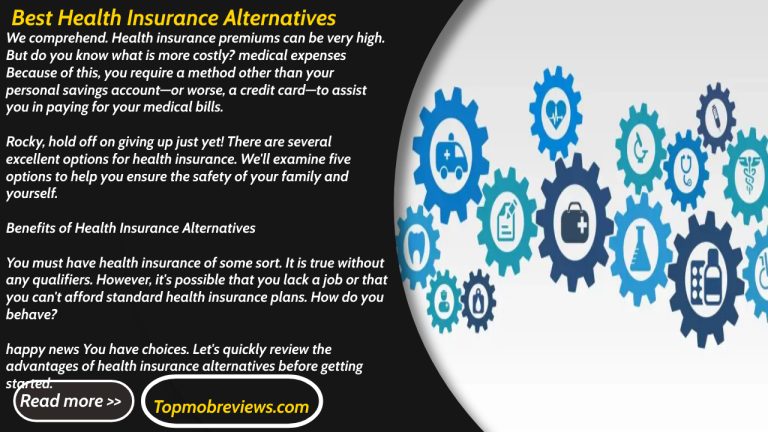How to Save Money on Things Your Health Insurance Doesn’t Cover 2022
Looking for strategies to reduce the price of your health insurance? the majority of them!
To reduce their premiums, many people are utilizing high-deductible health plans (HDHP). If you’re in good health and have enough in an emergency fund to cover your deductible, that’s a wise decision. Alternatives like health-sharing ministries are also becoming more popular for those who are cost-conscious. Both of these solutions are great.
Are there any drawbacks to these plans, other than the fact that you can save money on health insurance? They don’t always provide the whole range of services, though. Prescription medicines, dental care, and vision care might not be covered, at least not entirely. Over the course of a year, you might have to pay out of pocket thousands of dollars.
Let’s discuss the price of health insurance, what it includes and excludes, and cost-effective alternatives to fill in the gaps.
What Health Insurance Covers
Certain benefits are agreed to be covered by your health insurance company. (With such high premiums, there better be some advantages!) In fact, the Affordable Care Act mandates that the following services be covered by all private health insurance plans sold via the health insurance marketplace:
- Ambulatory care (the care you receive without being admitted to a hospital)
- Hospital emergency services
- Hospitalization
- Newborn and maternity care (before and after your baby is born)
- Services for people with substance use and mental health issues (including behavioral health treatment, counseling, and psychotherapy)
- Medications on prescription
- Services and equipment that assist you in recovering from an injury, as well as if you have a disability or a long-term condition (including physical and occupational therapy, psychiatric rehabilitation, and speech-language pathology)
- Lab tests
- Chronic disease management includes preventative measures, such as counseling, screenings, and vaccinations
Children’s services (including dental care and vision care for children - Benefits provided in state-run marketplaces could be different from those provided in marketplaces supported by the federal government. Even within the same state, different plans may differ from one another.
- Additionally, just because a service, like dental or vision care, isn’t on the list of 10 necessities doesn’t imply your insurance company won’t cover it. Examine your insurance policy to understand your coverage in full.
What Health Insurance Doesn’t Cover
There are gaps in any strategy, and you need to be aware of them. Do you have the appropriate health insurance? Contact a Trusted professional right now.
Here are several things you might assume are covered but aren’t necessarily, whether you’re looking for new coverage, starting Medicare, or just curious about how your current plan treats you:
- Immunizations for travel (such as typhoid or yellow fever vaccine in preparation for a trip overseas)
substitute treatments (such as acupuncture, massage therapy, or chiropractic care) - Cosmetic procedures
- Long-term care in a nursing home
- Oral, visual, and auditory care
- Treatment or surgery for weight loss
- Preventive measures
- Private healthcare
- Treatments for infertility
- Healthcare fraud
Remember that this is not a complete list. Reading your policy is the only way to find out what you are (or are not) insured for.
It’s also important to keep in mind that some of the advantages listed below might already be covered by your insurance. Things that are judged “medically necessary” are covered by insurance.
Need a good example? Following a mastectomy, reconstructive breast surgery is seen as medically necessary and is probably insured. Chiropractic therapy falls under the category of outpatient care and is certainly medically required if you have a back injury in an accident. However, that care might not be covered if you go to the chiropractor once a week to keep your back in good shape.
The key to covering is to never make any assumptions, whether positive or negative. Always check with your insurance to confirm the details before either foregoing a treatment (believing it will never qualify) or getting something done (while assuming it is eligible).
So much for questions about coverage. Knowing what things your plan won’t cover will help you search for less expensive ways to obtain those services. Let’s discuss how to save! How Health Cost Sharing Can Help Decrease the Cost of Health Insurance
Programs for sharing the expense of healthcare do not fall under the formal definition of health insurance. With a few minor exceptions, they function mostly in a similar manner to insurance. One of them is the opportunity to reduce healthcare expenses. How does it function?
Cost-sharing plans do not deal directly with doctors and hospitals, do not pay your expenses on your behalf, and do have monthly charges. Instead, you receive the funding for medical services through the cost-sharing program, and you are responsible for paying your own bills. As a result, your premiums will be reduced due to lesser overhead. Additionally, it implies that you’ll have to pay cash up front, wait for reimbursement, then barter for cash reductions! That means significant healthcare cost reductions.
Use Your Health Savings Account
Utilize a Health Savings Account if you are qualified for one! Savings on health insurance are essentially limitless in this situation. For those who are enrolled in a high-deductible health plan, a health savings account (HSA) is a form of savings account (HDHP).
It’s a triple tax-free miracle: You can contribute tax-free, grow tax-free, and withdraw tax-free to cover approved medical costs.
You can open an HSA through a bank, insurance company, or other financial institution if your employer doesn’t provide one.
Look at the advantages:
Multiple Contributors
You, your employer, a family member, or practically anyone else who wants to contribute to your HSA may do so.
Pretax Contributions
Say “tax shelter” with me. Federal income taxes are not (I repeat, are not) applied to contributions made through your employment. Sweet! Your contributions might not even be subject to state income taxes, depending on where you live.
Tax-Deductible Contributions
Even if you don’t itemize your deductions on tax form 1040, contributions made using after-tax funds are still deducted from your gross income when you submit your taxes.
Tax-Free Earnings
The account funds’ interest and other gains are tax-free. Taxman, take that!
Tax-Free Withdrawals for Qualified Medical Expenses
Keep in mind the important word: qualifying medical expenses (more on that below).
Funds Roll Over
Before being used, contributions to your account remain there. You can even invest the funds in your HSA to grow tax-free if you want them to roll over year after year and earn interest. It’s almost like a health-saving device, this thing!
Easy to Use
The majority of HSAs will issue you a debit card so you can immediately pay for prescription drugs and other medical costs. The card can also be used to withdraw money from an ATM. Just be careful to retain your receipts in case you ever need to show that the purchases were actually medically necessary because according to the IRS, these expenses are subject to audits for up to three years.
Completely Yours
If you switch employment or quit the workforce, your HSA follows you.
You must satisfy the following criteria in order to be eligible for an HSA:
- You are protected by a high-deductible health plan with an annual minimum deductible of $2,800 for a family or $1,400 for an individual.
- You lack any additional health insurance.
- You are not a Medicare beneficiary.
The most recent tax return filed by someone else does not list you as a dependent.
There are literally hundreds of medical expenses that your HSA can cover, as well as many that it cannot. Fortunately, the IRS goes into great detail about both. Here are a few instances of acceptable medical costs: 7
- Acupuncture
- Chiropractor services
- Dentist visits
- Physician’s fees
- Examinations for the eyes, glasses, surgery, and contact lens supplies
- Fertility treatments
- Batteries and hearing aids
- Healthcare services
- Lab expenses for insulin
- Medications on prescription
- Psychiatric treatment
- Counseling or therapy
Make a general request.
Never assume your doctor will prescribe your medication in its generic form. Make sure to double-check before you pay twice!
Select your pharmacy carefully.
One of the most expensive aspects of health insurance is the cost of drugs. However, a quick pricing comparison might be useful. Would you imagine that depending on the pharmacy, some medications can cost hundreds more?
According to a Consumer Reports investigation, the cost of medications can vary by 22 times depending on where you buy them. For one month’s supply of the same prescription, a medicine once cost $12 at one pharmacy and $270 at another! They discovered these enormous pricing discrepancies with many other medications, so that wasn’t the odd one out.
Employ your HSA.
Why do you have it? Save money on copays, prescription prescriptions, and other medications.
Look for a deal.
Inquire with your family doctor or pharmacist about joining any cash discounts, discount cards, or loyalty programs. Every little bit counts toward your overall health insurance cost savings.
Call the pharmaceutical company directly.
Get in touch with the drug’s producer directly if you’re still unable to pay for a particular prescription. Many businesses offer their medications for free or at a greatly discounted cost through patient assistance programs.
How to Reduce Dental Care Costs
Look for a discount.
Search the internet for new client discounts offered by particular dental offices. Visit websites like Groupon and Living Social instead. Cleanings often cost between $50 and $60.
Obtain a second viewpoint.
Get a second opinion if the treatment you require, such as braces or a root canal, is expensive. Likewise, compare prices at other offices. For instance, you are not required to have the recommended orthodontist for your child’s pediatric dentist provide their braces.
Employ your HSA.
Remember that you may pay for anything from fillings to cleanings to crowns to dentures using your Health Savings Account.
Request a discount and a payment schedule.
Need urgent assistance with important work? Request cash savings and a payment schedule. In this manner, you avoid receiving a huge charge all at once.
Go to a dental college.
Consider scheduling an appointment with a dental school for cleanings, X-rays, and preventative care.
9 Yes, a dental student will take a lot longer than a dentist with more experience. Nevertheless, a certified, insured supervisor constantly double-checks their work, and the money you’ll save is well worth the wait.
How to Reduce Vision Care Costs
Purchase from a warehouse or online.
You can purchase a full set of spectacles for under $100 from inexpensive online retailers like ZenniOptical and Warby Parker. Check out Costco Optical or an online merchant like 1-800-Contacts for contacts. To find out if you qualify for an even greater discount or faster shipping, get in touch with customer support. Just be sure you’re receiving free shipping; otherwise, the offer might not be as good as it seems.
Employ your HSA.
Have you seen a pattern with this puppy? Contact solutions and even contact solutions are covered by your Health Savings Account. Use it!
Save money before considering LASIK.
Spending $1,000 to $2,000 per eye may not seem like a cost-saving strategy, but when you factor in the yearly costs of exams, new contacts, cleaners, and new glasses, it might make sense. Just avoid taking on debt under the pretext of “saving money for the future.” Wait till you can if you can’t pay in cash right away.
Request cash reductions or self-pay options.
If you use the advice we’ve provided here, you can still receive what your family needs for less money even if you don’t have rock-star health insurance. It’s also important to remember to constantly ask for a discount. Always. When you’re motivated to negotiate, you usually succeed.
Cash is king when striking good healthcare arrangements, as usual. Additionally, as we previously mentioned, health cost sharing enables you to pay in cash for services and bargain for a nice discount!






